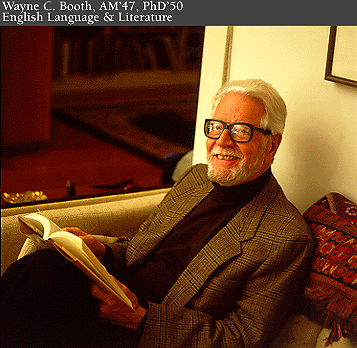Links
Archives
Tuesday, October 11, 2005
 Wayne Booth has died, age 84. He was UD’s thesis director at the University of Chicago. He it was who (as UD recounted in an early entry on this blog), hearing from another student that UD was on the verge of quitting grad school, hauled her into his office for a serious talk. I’ve always been grateful to this man, for many things, but especially for his having persuaded me to stay (of course his whole bit, as the New York Times obit notes, was the use of rhetoric). Wayne Booth has died, age 84. He was UD’s thesis director at the University of Chicago. He it was who (as UD recounted in an early entry on this blog), hearing from another student that UD was on the verge of quitting grad school, hauled her into his office for a serious talk. I’ve always been grateful to this man, for many things, but especially for his having persuaded me to stay (of course his whole bit, as the New York Times obit notes, was the use of rhetoric). Yet how scandalized UD was when she first encountered Booth in a seminar room! Fresh out of Northwestern, where she’d glombed onto Erich Heller, a tortured refugee from the Holocaust who dealt only in the densest and highest European modernism, she didn’t know what to make of the fact that the first novel Booth’s seminar took up was Wright Morris’s Ceremony in Lone Tree, one of them stark, thin, flat in the middle of nowhere, not much to say American landscape type things. Bah! And I still say bah. But Booth was intriguing - a handsome genial big old all-American (“[Booth was] born on Feb. 22, 1921, in American Fork, Utah. His family was descended from Mormon pioneers, and as a young man he embraced his faith, becoming a missionary in Chicago. But little by little, he began to wrestle with church teachings. It was a struggle, he later said, that informed both his decision to root himself in the secular world and his particular interest in rhetoric.” This bears a remarkable non-resemblance to UD.) who managed to be at the same time an authentic intellectual. He was courtly and kind with us, but also demanding and focused, and his clarity of thought enabled us to think profitably about literary genre. Because he was an Aristotelian. He’d been a student of the Chicago Aristotelians, a group interested in isolating the unique characteristics of the literary (it’s now fashionable to steamroll right over even the hint of an interest in this question as you power your way toward vast political claims of the sort Ophelia Benson ridicules a couple of posts down from this one). Booth wanted to understand the precise aesthetic and ethical act the writing and reading of literature represented, as the Times notes: [For] Professor Booth, literature was not so much words on paper as it was a complex ethical act. He saw the novel as a kind of compact between author and reader: intimate and rewarding, but rarely easy. I'll always think of Booth as part of that cohort of sly old guys at the University of Chicago -- guys like Norman Maclean, whose earnest deep-rooted all-Americanness could fool you into thinking they could never write something as dark and elusive as A River Runs Through It. |